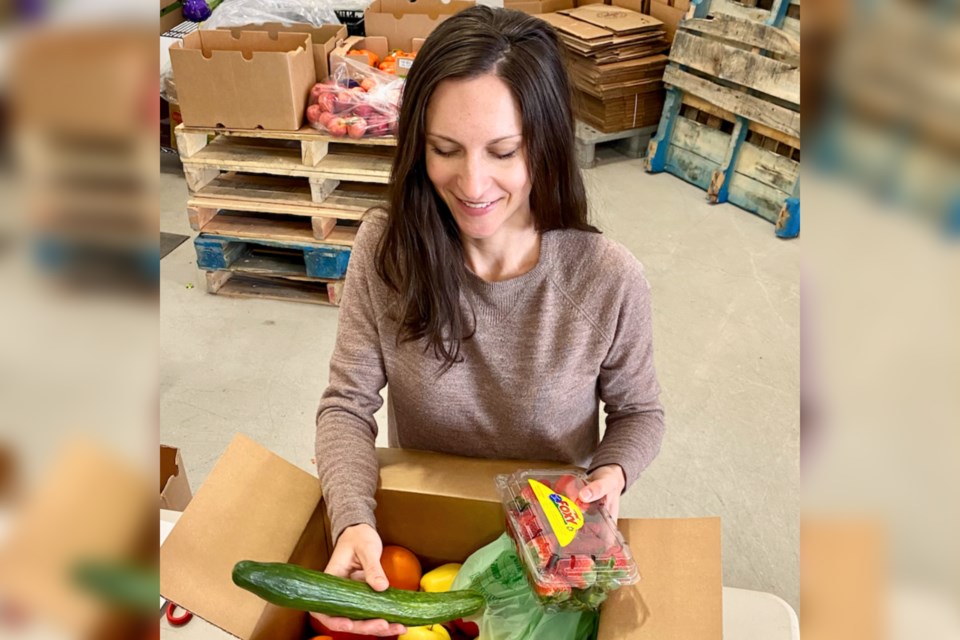A growing service is bringing Bradford residents the chance to munch on misfit food.
Barrie-based Eat Impact recently expanded to Bradford, helping customers fight food waste by purchasing produce that is “too bendy, too big, too ugly” to be sold in stores and would otherwise be thrown away.
A 2019 report from Environment and Climate Change Canada titled ‘Taking stock: Reducing food loss and waste in Canada’ estimates that 11 million tonnes of food (or about 20 per cent of all the food produced in Canada annually) becomes avoidable food loss or waste — food that could have been eaten, but instead was added to landfills, incinerated or managed as organic waste.
“We are on a mission to build a more sustainable food system and help people eat well, do good and save money,” Eat Impact Founder Anna Stegink said in a press release.
The service works with local producers and retailers to purchase surplus or misfit produce and deliver it to customers at prices it claims are as much as 40 per cent less than typical prices at grocery stores.
Stegink, who also founded Simcoe Harvest in 2020, founded Eat Impact in November 2022 and initially focused on testing the concept in Toronto.
“Once we gained traction we expanded our delivery area east and west of the city. We have recently expanded our delivery zone closer to home and are now delivering to Barrie, Midhurst, Innisfil, Bradford and Keswick as well,” Stegink said via email.
Newmarket resident Avis Evans has been using the service since January and said she has been “absolutely delighted” by it.
“The idea that I would help the producers and farmers as well and then the environmental aspect, I think it’s a great concept,” Evans said, noting that many of the boxes and packaging is even reused as part of the service.
“If the producer can use them again then that saves everybody. I just think it’s a win win,” she said.
In her 70s and with her husband in his early 80s, she said they started using grocery delivery services during the pandemic, but when it comes to produce, Eat Impact has essentially replaced grocery-store offerings for them.
“We were just blown away. And the variety is what I see,” Evans said, noting they’ve received papaya, guava, several different types of squash, five different types of tomatoes, five different types of onions and several different types of potatoes.
Of all the items so far, she thought the most surprising was the pineapple and the grapefruit and she thinks it’s saving them money too.
“I’ve figured it out: For the cost plus the little bit for delivery, it works out to $2.30 an item. Well, if you get a pineapple, that’s a pretty cheap pineapple,” Evans said, adding they’re plenty fresh, too.
“I’ve got a grapefruit in my fridge that’s probably three weeks old and it’s still fine. The apples to me taste fresher than what I’ve got in the stores,” she said.
The one time she received an item that wasn’t fresh, she messaged the company and they sent her a replacement, she explained.
Evans said she has no problem with ugly produce “because most of the stuff you’re going to slice and chop and cut up anyways,” and when it comes to odd shapes and sizes, “if you have any concept of how stuff grows, that’s how it is.”
For anyone hesitant, her advice was simple: “I would say, 'Try it,'” she said.
It’s not just customers who have had good experiences with the service.
Vicky Ffrench and her husband Mike run Cookstown Greens in Thornton, a year-round certified organic vegetable farm growing micro-greens, mushrooms and root vegetables.
“Anna and I met in the beginning of the pandemic with her other business Simcoe Harvest. When she introduced that she would be doing Eat Impact — which is the ugly, the seconds, the alternatives — I jumped on board, because we also have a good amount of seconds that we don’t like to waste,” Ffrench said.
While it varies from week to week, she estimates the farm has sold 23-45 kg of produce to Eat Impact per week, including carrots, beets, parsnips and parsley root.
When it comes to why some of the produce might not look good enough to be sold in stores, Ffrench explained that many of the carrots are just broken, some of the parsnips or parsley might not have grown large enough and some of the beets actually grew too much.
“You can’t really tell the vegetables that I want you to be big or small,” she said with a laugh.
While they also donate off-shaped produce to the Barrie Food Bank as well as other organizations, Ffrench said they’re happy to have more options to stop food from going to waste.
“It’s so good to know that there are consumers out there that don’t care what their food looks like, and we want to make delicious food accessible to everybody,” she said.
At Eat Impact, the produce selection varies weekly and customers can customize their box to swap items they don't want or need with ones they prefer.
For more information, visit www.eatimpact.ca.



